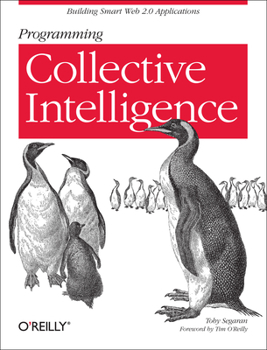Programming Collective Intelligence: Building Smart Web 2.0 Applications
Select Format
Select Condition 
Book Overview
Programming Collective Intelligence takes you into the world of machine learning and statistics, and explains how to draw conclusions about user experience, marketing, personal tastes, and human behavior in general -- all from information that you and others collect every day. Each algorithm is described clearly and concisely with code that can immediately be used on your web site, blog, Wiki, or specialized application. This book explains: Collaborative filtering techniques that enable online retailers to recommend products or media Methods of clustering to detect groups of similar items in a large dataset Search engine features -- crawlers, indexers, query engines, and the PageRank algorithm Optimization algorithms that search millions of possible solutions to a problem and choose the best one Bayesian filtering, used in spam filters for classifying documents based on word types and other features Using decision trees not only to make predictions, but to model the way decisions are made Predicting numerical values rather than classifications to build price models Support vector machines to match people in online dating sites Non-negative matrix factorization to find the independent features in a dataset Evolving intelligence for problem solving -- how a computer develops its skill by improving its own code the more it plays a game Each chapter includes exercises for extending the algorithms to make them more powerful. Go beyond simple database-backed applications and put the wealth of Internet data to work for you.
"Bravo I cannot think of a better way for a developer to first learn these algorithms and methods, nor can I think of a better way for me (an old AI dog) to reinvigorate my knowledge of the details."
-- Dan Russell, Google
"Toby's book does a great job of breaking down the complex subject matter of machine-learning algorithms into practical, easy-to-understand examples that can be directly applied to analysis of social interaction across the Web today. If I had this book two years ago, it would have saved precious time going down some fruitless paths."
-- Tim Wolters, CTO, Collective Intellect
Customer Reviews
Rated 5 starsOne of the BEST book I've read for last 10 years
I bought lots of books on the field of machine learning, but it was hard to understand when it goes deeper with lots of mathmatics. Even though I understand the concept, I had no idea how to implement it. After reading this book, all the theories that I've been struggling with became very clear. Toby did a great job to explain these tough topics with proper graphics and easy examples. This book is one of the best book I've...
0Report
Rated 5 starsThe most accessible book on machine learning I've found
I first learned of this book just a few weeks ago, shortly before it was available. I immediately read the sample chapter on the publisher's website and was certain I had to get a hold of a copy. I was not in the least bit disappointed with what I found. It has been quite a while since I've looked at any Python code (I'm more of a Ruby fan, personally), but the code is easy to follow and it's a simple matter to extract the...
1Report
Rated 5 starsAccessible introduction to complex topics
Segaran has done an excellent job of explaining complex algorithms and mathematical concepts with clear examples and code that is both easy to read and useful. His coding style in Python often reads as clearly as pseudo-code in algorithm books. The examples give real-world grounding to abstract concepts like collaborative filtering and bayesian classification. My favorite part is how he shows us code (gives it to us!)...
0Report
Rated 5 starsA "hands-on" approach to an otherwise abstract topic
"Programming Collective Intelligence" is a great book. I took a college course on data mining and this book really would have come in handy. From a "hands-on" programming perspective, the information on the useful libraries in python for crawling, parsing RSS feeds, python drawing, and accessing popular RESTful APIs are really valuable. The code samples are well documented and rather timely. I think Toby has done an amazingly...
0Report














